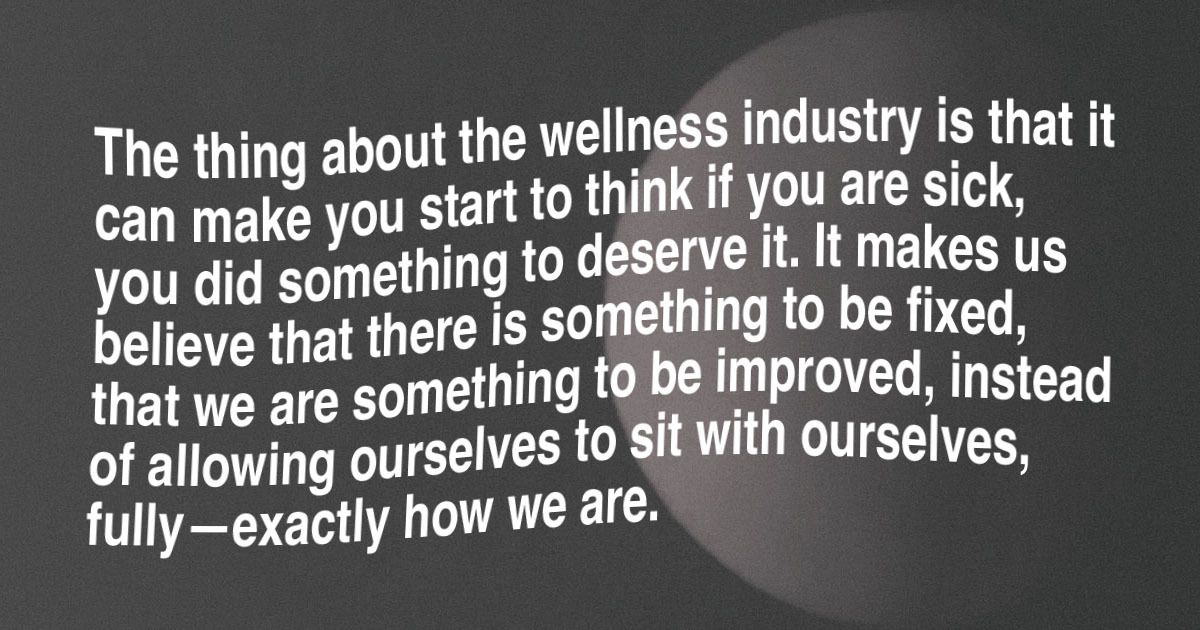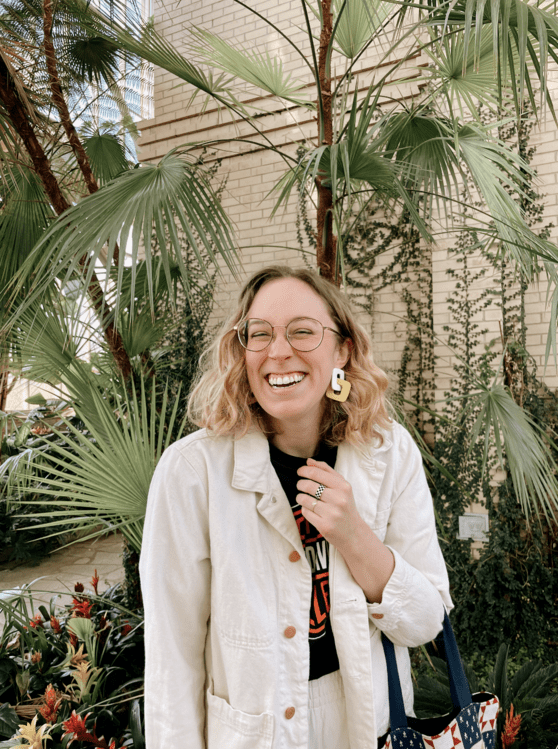This is a slightly edited excerpt of a three-part series. You can read the entire series (Part One, Part Two, + Part Three) as it was originally posted by the author in their newsletter, Healing Field Notes.
Please note that the topics of disordered eating, ableism, and fatphobia are included in this.
I am an ex-member of the Cult of the Wellness Industry. Between 2016 and 2019, you could find me swearing by essential oils for all ailments, eating up fear-mongering tactics around all chemicals found in everyday products, and trying to recover from my undiagnosed OCD strictly through homeopathic remedies.
I still find myself falling down the hole of targeted ads when I see something related to inflammation pop up and wonder if that is *the thing* that cracks the code to my feeling better. But I spent three years in a wellness haze, looking for just about anything to “cure” my mental illness, chronic pain, and other health issues. I fell for it all before. And I can’t go back.
It all came crashing down in 2019 when I stopped working with a restriction-based hormone coach. After weeks and weeks of detoxing with chlorophyll and lemon juice every morning, restricting all things dairy, gluten, and sugar, I felt worse than ever. After a therapy session talking about how frustrated I felt with how working with my hormone coach was going, my therapist recommended I read Anti-Diet. I went to a local bookstore, drove to a coffee shop to start reading it, and finished the entire book in four hours.
I’ve had some form of chronic pain my whole life. I spent many days in elementary school in the nurse’s office, complaining of nausea, chest pain, and shortness of breath. I moved into adulthood with the same symptoms, with an extra layer of muscle and joint pain alongside inextricably painful and irregular periods. I have always been into a little bit of the “woo-woo witchy granola girl” life and sought out more “natural” forms of healing, but I did not have a nuanced or holistic lens when I was trying to find relief.
When I was 19, you could have found me at your local witchy shop reading about which crystals were good for grounding and bought any amethyst or hematite jewelry I could find to supposedly help reduce stress and tension, and flush out toxins. You could also find me following wellness influencers acting like experts in pop psychology, meditating to try to fix it all, and berating myself when I lost focus.
Before I go any further, I want to make it clear, I do believe in energy healing. I am not anti-natural remedy or holistic healing. I take magnesium at night to help my muscles and sleep. I believe in the power of intention. Meditation and mindfulness are tools I use in my OCD recovery. However, like many things in the wellness world, so many holistic avenues of healing have been co-opted, appropriated, exploited, and whitewashed from communities of color, and it’s our job to learn the difference.
My early 20s were a blur of going broke for crystals, yoga classes, supplements, organic food, probiotics, and essential oils. I followed people who did daily coffee enemas and spouted misinformation about the flu vaccine. I wove in and out of different gut health regimens. But I wasn’t feeling any better.
After reading Anti-Diet, I realized how much money I had spent, and how I had been tricked into diet culture by another name, I felt so ashamed and lost. I unfollowed all the wellness girlies, threw away my supplements, poured the probiotics down the drain, and shut down. I dissociated from my body completely. Until April 2021, when my heart almost stopped.
The thing about the wellness industry is that it can make you start to think if you are sick, you did something to deserve it. It makes us believe that there is something to be fixed, that we are something to be improved, instead of allowing ourselves to sit with ourselves, fully—exactly how we are.

I get it, though. Before my major heart issue and autoimmune diagnosis, I had been trying to find answers to my chronic pain, only to be met with conversations about how to lower stress, or how I needed to heal my gut, or people telling me that psych medications would do nothing but make it worse because pharmaceutical companies can’t be trusted. All of which threw me deeper into fear-based disordered eating because there simply aren’t enough resources about holistic, HAES, non-diet nutrition. It doesn’t help that a big reason this wellness economy exists is that it depends on inaccessible medical institutions not caring for communities, especially those at the margins.
But I began to find some balance. I turned to books such as The Politics of Trauma, Emergent Strategy, My Grandmother’s Hands, and Care Work, and my eyes opened further. Because of my trauma history, my default is often dissociation. Embodiment does not come easy for me. But I have learned to practice with intention. I follow people such as Reyna Cohan and Shannon Kaneshinge, who remind me how to move my body kindly and tenderly, and to self-advocate often. When I find the urge to spend money on a wellness product, I take a moment to ask myself:
Am I being sold something that’s trying to solve a problem? Will this create more problems, including debt? Who is selling me this? Why are they selling me this? What are their motivations and intentions? How can I lean into curiosity about my own body instead of being fearful of it?
The wellness economy thrives on fear. I went through a phase where I looked at every ingredient of every item I ever bought because I was scared of toxins and would be influenced to buy a product that cost three times as much to avoid them. For me, it became an unhealthy compulsion, but it’s true that the wellness industry invites us to ask all too often: What’s the thing to be scared of this week? We are spoon-fed rhetoric such as the “dirty dozen,” which further demonizes food instead of being curious about how to tackle the climate crisis that threatens our soil. We are sold green powders as quick nutrition enhancers instead of these companies putting that money toward ending food apartheid and resisting the productivity culture that makes us search for these “quick fixes” in the first place. Psychiatric medications are further stigmatized and shamed while 60 million Americans with mental illness struggle to access the treatment they need at all.
The wellness economy thrives on an individualistic framework. It puts the onus on us to fix ourselves instead of asking how we can put more effort into community care and resource sharing. It thrives on shame and discourages self-compassion. It relies on an illusion of control, when in fact, we can’t control anything at all.
It wasn’t until I began understanding the interconnectedness of wellness that I could unravel the insidious nature of the industry from my own consciousness. Essential oils don’t make me feel more connected to myself, but being in a community with other chronically ill people who teach one another how to advocate for our care does. Yoga based on aesthetics and form doesn’t help me feel connected to my body, going on a hike at my local state park does. Disability Twitter (now known as X) has helped me access tips and resources around managing chronic pain and solidarity around continuing COVID precautions. DoorDash-ing friends to make sure they are feeding themselves when they are down in the depths of rock bottom is how I keep my friends alive. Entering into validating and affirming queer friendships and relationships that can withstand navigating conflict resolution and open, vulnerable communication made me well.
If we continue to believe that we can spend or hack our way into wellness, we will remain unwell. If we continue this narrative that individual lifestyle changes can protect us from a global health crisis, being holistically well will remain inaccessible. When we continue to appropriate and erase the Black, Brown, and Indigenous histories of care and wellness, the most marginalized will remain unwell. Wellness can sometimes depend on the individual choice you make about your body, but it always depends on a collective understanding, acknowledgment, and care for one another.

Sam (they/them) is a Midwest-based writer and creator with experience in writing, digital content creation, and community organizing. They are passionate about redefining conversations about wellness to make them accessible and inclusive, destigmatizing mental health through transformative practices, and supporting communities rooted in collective care and mutuality. They were a finalist in the 2019 Button Poetry Chapbook Contest, headlined the 2018 Melbourne Spoken Word Poetry Festival, and have toured across the US and Canada. You can read their work on Insider, Swift Wellness, and GoodNewspaper. They are a freelance writer, love to cook, and wholeheartedly believe a Midwest sunset is superior to all sunsets. Their book from Game Over Books, titled Until Tender, is out now.
You can follow Sam on Instagram or visit their website.
Heidi
Thank you so much for sharing. I feel like I’m reading a bio about myself here, and have the book in my cart now. Some internal self reflection is due. Appreciate you and proud of you!